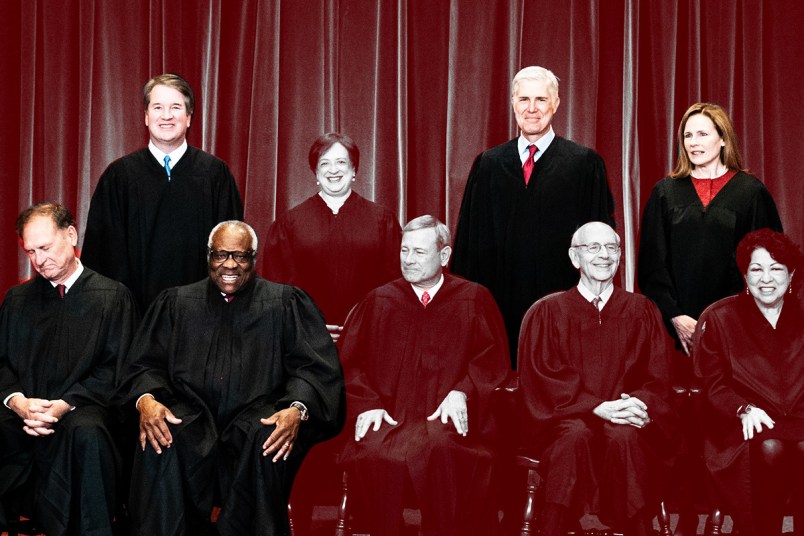For a long time, the conventional wisdom was that Roe’s death would come in 1,000 cuts.
The calculus was a political one — that the conservative justices, loath to spark a liberal backlash, would defang Roe in small, probably boring, ways that would escape the attention of casual observers.
As a theory, it made sense. Many red states have had great success all but killing abortion access within their boundaries already by micro-legislating things like counter height in abortion clinics and admitting privileges for their doctors.
But the conservative justices upended that belief back in December, when they less tiptoed and more stomped on the rhetorical eggshells surrounding the overturning of a 50-year precedent. Excepting Chief Justice John Roberts, they didn’t dither over the details of the 15-week ban Mississippi was theoretically interested in; they treated the case like what it was, an opening to overturn abortion rights.
The leaked draft is the natural conclusion of that attitude.
Caveats abound: this is just a draft, and the language may be tempered before the Court releases a final version. While Justice Samuel Alito, not exactly known for his self-moderation, is the reported author of the text, we don’t know if the others who reportedly voted with him in conference — Justices Amy Coney Barrett, Brett Kavanaugh, Neil Gorsuch and Clarence Thomas — have signed on to this particular language.
But if the final version does look similar to this draft, it’ll be clear that the rightwing judges are taking a victory lap, potential electoral backlash be damned.
Right there in the text, Alito seemingly offers up rationale for being candid in his celebration.
“We do not pretend to know how our political system or society will respond to today’s decision overruling Roe and Casey,” he writes. “And even if we could foresee what will happen, we would have no authority to let that knowledge influence our decision.”
Political forecasting out of the way, Alito all but crows at Roe’s demise.
“Roe was egregiously wrong from the start,” he writes. “Its reasoning was exceptionally weak, and the decision has had damaging consequences. And far from bringing about a national settlement of the abortion issue, Roe and Casey have enflamed debate and deepened division.”
That abortion rights deepened divisions is a wild swing to take, given that this decision would knowingly set up a country bifurcated between states that allow abortion access and those that prohibit it. But he gets in his jabs where he can.
In his use of the phrase “egregiously wrong,” he’s also echoing Kavanaugh, who applied the characterization to the decisions upholding Japanese internment and greenlighting state-sanctioned segregation — infamous cases that blight the Court’s history.
Alito moves from disingenuousness to flat-out lying in his eagerness to detail the suffering of the anti-abortion movement.
“The court short-circuited the democratic process by closing it to the large number of Americans who dissented in any respect from Roe,” he writes.
Those dissenters, who have successfully shuttered abortion clinics throughout the south and middle of the country and heaped up laborious restrictions to getting the procedure including requiring multiple visits, preemptive ultrasounds and sometimes even anti-abortion counseling, would likely disagree with his dim assessment.
While Alito expresses nothing but sympathy for the anti-abortion contingent, he chides the majority of the American public that supports abortion rights for simply wanting too much.
“In interpreting what is meant by the Fourteenth Amendment’s reference to ‘liberty,’ we must guard against that natural human tendency to confuse what that Amendment protects with our own ardent views about the liberty that Americans should enjoy,” he reprimands.
Alito also injects the document with a hearty dose of callousness for the plight of the women unhindered abortion bans will endanger.
As he and his four conservative allies, all but one of whom were appointed by presidents who lost the popular vote, dictate human rights for the entirety of the country, he shrugs at the affected people’s powerlessness.
“Women are not without electoral or political power,” he writes.
The Court’s prior concern about protecting women that would die in the physically traumatic process of giving birth after an unwanted pregnancy warrants only his dismissal.
“Why, for example, does a State have no authority to regulate first trimester abortions for the purpose of protecting a woman’s health?” he muses. “The Court’s only explanation was that mortality rates for abortion at that stage were lower than the mortality rates for childbirth. But the Court did not explain why mortality rates were the only factor that a State could legitimately consider.”
This is not the language of someone trying to bridge America’s divisions. It’s the language of someone who’s won, gloating to an audience that can do little about it.



